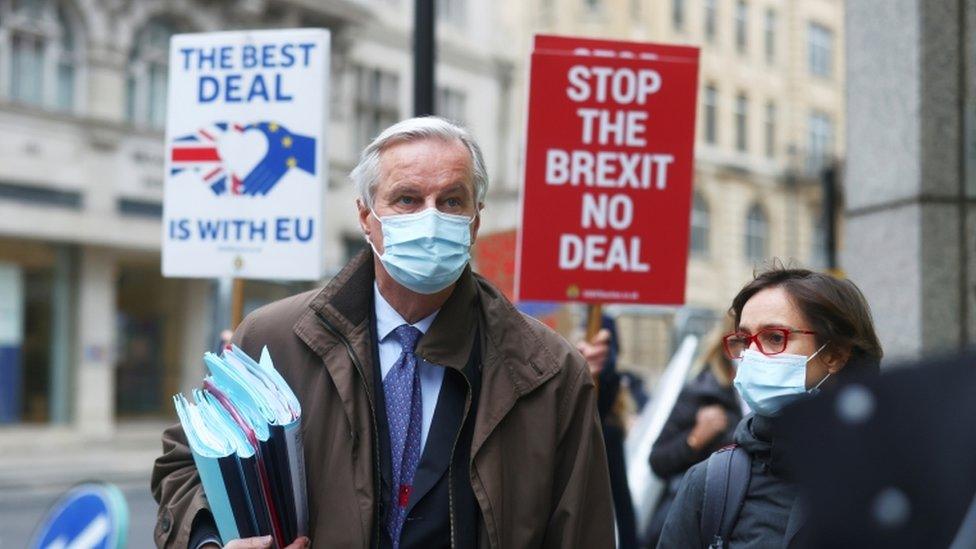UK-EU trade talks: UK still committed to EU deal as differences remain
- Published

EU chief negotiator Michel Barnier leaving the trade talks in London
The UK remains "committed" to reaching a trade deal with the EU as soon as possible but will not change its stance on key issues to do so, No 10 has said.
Face-to-face talks are continuing in London in what is seen as a crucial week if an agreement is to be reached.
No 10 said progress was made over the weekend but differences remained over fisheries and competition once the UK departs the EU's single market in 2021.
Germany's Angela Merkel has insisted a deal is "in everyone's interest".
"We hope that the negotiations will have a good end," she told reporters.
But the German chancellor also warned that time was running out and the 27-member bloc had made clear "we don't need a deal at any price".
The UK left the EU on 31 January and is in a transition period until the end of the year.
From 1 January, the UK will no longer be bound by EU rules on fishing, farming and other industries and will also be outside the bloc's customs union and internal market.
The two sides have been discussing their future economic partnership since March.
If no agreement is reached by the end of the year, trade between the UK and the EU will default to World Trade Organization rules, resulting in tariffs on goods crossing the channel and other trade barriers.
Both sides say they want to avoid this but have made contingency plans for a "no deal" scenario.
Fish catch
Downing Street said "some progress" had been made in weekend talks between the UK's chief negotiator David Frost and his EU counterpart Michel Barnier.
While the UK remained "keen and committed" to getting a deal, a No 10 spokesperson said the government had been clear it would not change its negotiating position in a way that would compromise its sovereignty.
There has been little sign of a breakthrough in recent weeks on the major outstanding issues, including how much access EU countries will have to UK fishing waters after the UK leaves the Common Fisheries Policy.
It was reported on Friday that the UK had rejected an offer from the EU that would have seen the bloc give up between 15% and 18% of its current quota of stocks caught in British waters.
Downing Street said its position remained that quotas should be decided on a "zonal catchment basis" and reflect the fact the UK would be an "independent coastal state" controlling its own waters from 1 January.
Earlier, Environment Secretary George Eustice told the BBC that the UK wanted to see annual negotiations on quotas and an overall increase in the size of the UK's catch from its own waters.
The BBC's Brussels correspondent Nick Beake said the EU was still opposed to annual negotiations but had accepted that access to UK waters for EU boats could not remain the same as it is now.
Separately, No 10 said the government was "confident" there would be enough time to get the necessary legislation through Parliament needed to implement the treaty if a deal was reached.
The EU Parliament is also expected to be asked to ratify any agreement before it comes into force.
Speaking on Monday, Ireland's Foreign Affairs minister Simon Coveney said an agreement needed to be "finalised this week if possible" to allow time for it to be ratified and preparations to be made.